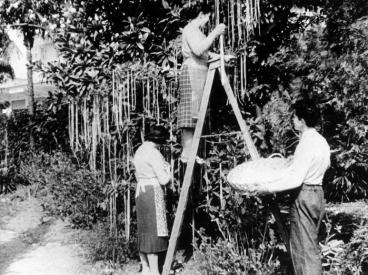Quality Brands and Sustainable Food Systems
In April 1957, the BBC broadcasted a short report showing a Swiss family harvesting their spaghetti crop from the family tree. Numerous viewers called the station after the coverage, interested in acquiring their trees. This anecdote, recounted by Carolyn Steel in her revealing essay "Hungry City," reflects the tremendous disconnect that was already beginning to develop between consumers and food production.
[[{"fid":"44468","view_mode":"default","fields":{"format":"default","field_file_image_alt_text[und][0][value]":"BBC, Panorama (1957)","field_file_image_title_text[und][0][value]":"BBC, Panorama (1957)","field_author[und][0][value]":"BBC"},"link_text":null,"type":"media","field_deltas":{"1":{"format":"default","field_file_image_alt_text[und][0][value]":"BBC, Panorama (1957)","field_file_image_title_text[und][0][value]":"BBC, Panorama (1957)","field_author[und][0][value]":"BBC"}},"attributes":{"alt":"BBC, Panorama (1957)","title":"BBC, Panorama (1957)","height":523,"width":699,"class":"media-element file-default","data-delta":"1"}}]]
BBC, Panorama (1957)
In recent decades, different individual and collective, public and private, urban and rural initiatives have been promoting the recovery of this lost relationship and re-localizing production under integrated sustainability criteria. Cities and rural territories in the EU are an active part of this process, often around quality brands, considered instruments capable of generating added value and gaining a position in the global market.
In practice, we sometimes find an oversaturated environment of brands that coexist with hardly any articulation between them or any net generation of positive impacts. A reflection on their performance and evaluation seems timely to contribute to the effective development of sustainable food systems.


